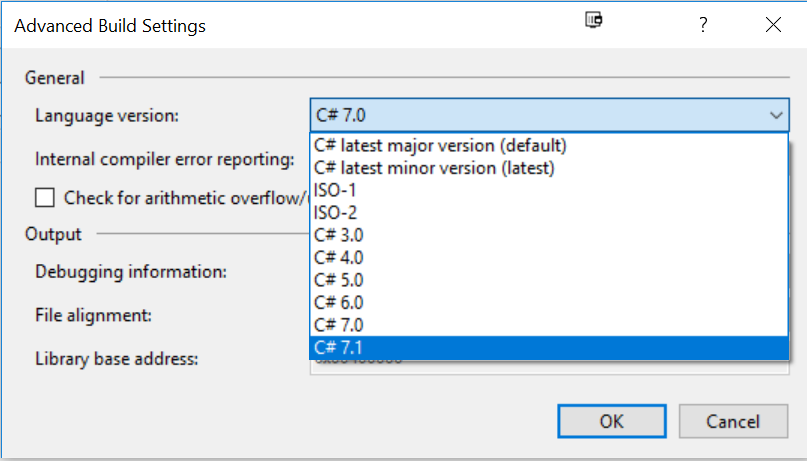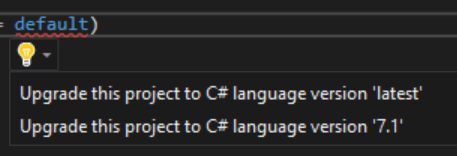Using C# 7.1
C# 7.0 was released as part of Visual Studio 2017 (version 15.0). While we work on C# 8.0, we will also ship features that are ready earlier as point releases.
C# 7.1 is the first such release. It will ship along with Visual Studio 2017 version 15.3. To try it out today, you can install Visual Studio Preview side-by-side, quickly and safely.
As you start using new C# 7.1 features in your code, a lightbulb will offer you to upgrade your project, either to “C# 7.1” or “latest”. If you leave your project’s language version set to “default”, you can only use C# 7.0 features (“default” means the latest major version, so does not include point releases).
Note: make sure you select Configuration All Configuration, as Debug is the configuration selected by default when editting a project.

Here are more specific instructions for using C# 7.1 in ASP.NET and ASP.NET Core and .NET CLI. The NuGet compiler packages for this release are versioned 2.3.
You can provide feedback on the C# features on the Roslyn repository or via the “Report a Problem” button in Visual Studio.
C# 7.1 features
In addition to numerous issues fixed in this release, the compiler comes with the following features for C# 7.1 (summarized below): async Main, pattern-matching with generics, “default” expressions, and inferred tuple names.
You can find more details about C# 7.1 and our progress on C# 7.2 and 8.0 in the language feature status page.
Async Main
This makes it easier to get started with async code, by recognizing static async Task Main() {...await some asynchronous code...} as a valid entry-point to your program.
Pattern-matching with generics
This allows using open types in type patterns. For example, case T t:.
“default” literal
This lets you omit the type in the default operator (default(T)) when the type can be inferred from the context. For instance, you can invoke void M(ImmutableArray<int> x) with M(default), or specify a default parameter value when declaring void M(CancellationToken x = default).


Inferred tuple names
This is a refinement on tuple literals (introduced in 7.0) which makes tuple element names redundant when they can be infered from the expressions.
Instead of writing var tuple = (a: this.a, b: X.Y.b), you can simply write var tuple = (this.a, X.Y.b);. The elements tuple.a and tuple.b will still be recognized.

Error version pragma
This is a small undocumented feature to assist with troubleshooting language version issues. Type #error version and you will see the version of the compiler that you’re using, as well as your current language version setting.
